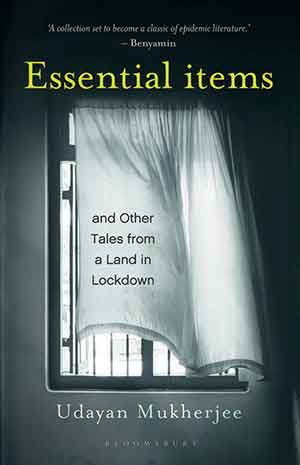Consuming news this year has been a tumultuous ride over varying emotions — from heart-wrenching to barely amusing. The pandemic has affected every individual differently and economic background, profession, caste, gender, physical abilities and geography have all played into determining the degree of vulnerability one is exposed to. Author and former financial journalist Udayan Mukherjee justifiably named his latest book of short tales Essential Items And Other Tales from a Land in Lockdown (Bloomsbury; Rs 499) as he deftly explored 10 vastly different life experiences in India, all tied together by the common theme of a lockdown.
Going through the 10 short stories in this book in one go is similar to taking a long walk through an Indian city, where one makes it a point to visit every lane, every corner, every high-rise and every slum area. Only here, the author seems to have taken that definitive walk himself while holding a mirror in his hands. He manages to get into the shoes of various demographic only to paint a picture from a day in their lives that has changed so drastically in this pandemic. However, the picture is so simple, relatable and yet so vivid, you’d be experiencing deja vu for having met these characters before.
Two workers in a funeral home in Benaras brave their fears to build a life of basic security, if only for the temporary duration of few months of ‘ruined business’ in A Life or Death Situation; Achala, who works as a maid finds herself struggling with her health on being sent on a ‘paid vacation’ by her employers in Holidays; a foreigner from London with ambitious dreams of conquering mountains in India and China is stuck in a village with a young boy and his grandfather in Border Town; and the affluent slice-of-life from a terrace party in Delhi replete with an idealist start-up founder and a boisterous host can be found in The Party. The stories appear familiar because the imaginative ones among us have sat and pondered on the well-being of those we have seen struggle more than ourselves around us.
The style of writing is so simple that difficult thoughts tend to make a deeper impact on the readers. Mukherjee provides commentaries on caste with the same nonchalance as he shines the spotlight on a couple spending Rs 40 lakhs on a coveted painting while discussing the plight of their factory workers in the same breath. “He didn’t lack in intelligence or imagination; only a surname,” he writes of Kallu, the dom at a funeral house. Monetary status wages a war with moralistic standards in his tales where even cyclone Amphan plays an important character. In his story Shelter from the Storm, migrant workers find themselves stranded in a Rajbari in Calcutta.
This is perhaps what makes Essential Items an essential read in this lockdown. Mukherjee seems to have taken our thoughts and put faces and pain and jubilation behind them, which have now come out as short stories which don’t, for a second, feel didactic.

There is humour in the tales — humour steeped in inexplicable darkness reflecting a society that seems shiny on the outside but is gnawed in places on the inside. The cover that shows a languid afternoon through the window with a billowy curtain, is an invitation to the world at large to dare take a peek into a flawed life. A life where a story doesn’t have a precise end and is instead just a page from the every day of the character you choose to explore.
Confronting the ingenuity of everyone’s lives on stalled plans and dreams feels and tastes real in the author’s descriptions that are scant yet effective. One doesn’t leave craving for an ending, just contentment at having the privilege of a glance.
The author most beautifully questions privilege, sometimes directly through the words of his characters like Madhav in The Party, and sometimes by a simple narration of an event. Privilege rears its complicated talons through the contrasting characters, where even an otherwise understanding and loving family is compelled to witness domestic abuse that stems from the fear of a hunger-filled, poverty-stricken, jobless days of the future. Even the business of death comes under question in this poignant book that most definitely makes for an ‘essential’ addition to your post-pandemic bookshelf.











